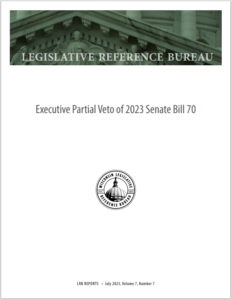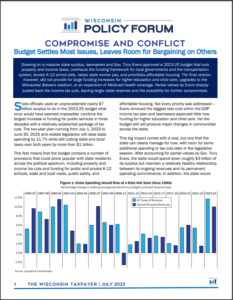
In this update:
- Administration Updates
- Budget Updates
- Election Updates
- Upcoming Events
- Fundraising Opportunities
Administration Updates
Evers signs bipartisan literacy bill into law
 On Wednesday, Gov. Tony Evers (D) signed into law AB 321 — now 2023 Wisconsin Act 20 — a bill authored by Rep. Joel Kitchens (R) aimed at improving literacy outcomes statewide. The bill would establish the Office of Literacy in the Department of Public Instruction and contract 64 full-time literacy coaches who would help teachers implement the science of reading, a literacy model structured around phonological awareness, phonemic awareness, phonics, building background knowledge, oral language development, vocabulary building, instruction in writing, instruction in comprehension, and reading fluency. The bill had bipartisan backing in the Assembly and Senate, as well as the support of DPI Superintendent Jill Underly.
On Wednesday, Gov. Tony Evers (D) signed into law AB 321 — now 2023 Wisconsin Act 20 — a bill authored by Rep. Joel Kitchens (R) aimed at improving literacy outcomes statewide. The bill would establish the Office of Literacy in the Department of Public Instruction and contract 64 full-time literacy coaches who would help teachers implement the science of reading, a literacy model structured around phonological awareness, phonemic awareness, phonics, building background knowledge, oral language development, vocabulary building, instruction in writing, instruction in comprehension, and reading fluency. The bill had bipartisan backing in the Assembly and Senate, as well as the support of DPI Superintendent Jill Underly.
In a press release announcing the bill’s signing, Gov. Evers made the following statement:
“We have to ensure our kids have the reading and literacy tools and skills to be successful both in and out of the classroom. This bill, modeled after initiatives that have been successful in other states and fine-tuned with significant changes throughout the legislative process, is a step in the right direction,” said Gov. Evers. “But at the end of the day, the bottom line for me is that reading curriculum is only one small part of the equation to ensuring our kids are prepared for success—we know that kids who are hungry, in crisis, or experiencing other challenges at home might have trouble focusing in class or on their studies, be distracted or disengaged at school, and have a hard time completing their coursework.
“So, if we want to improve outcomes for kids in our classrooms across the board, this bill is only one small part of the work we have to do—we must continue making meaningful investments in our kids and our schools, bolster our education workforce to help keep class sizes small, and expand access to mental health services and healthy meals in our schools so our kids can bring their full and best selves to our classrooms.”
In a prepared statement, Rep. Kitchens thanked Gov. Evers for signing the bill and said the new law would have a significant impact on the way reading is taught in the state. “Teachers will be retrained in the science of reading, schools will get new curriculum, struggling students will be caught sooner, they will get the help they need and their parents will be informed. These changes will help make sure more kids are reading at grade level and will succeed in school.”
Evers says he’s willing to work with GOP on tax cuts for middle class
 Tax cuts continue to be a discussion point between the state’s executive and legislature following Gov. Tony Evers’ (D) partial veto of a GOP-backed plan to cut income taxes. While visiting a child care center in Montello this week, Gov. Evers told reporters that he would be willing to work with Republican lawmakers to pass additional tax cuts for the middle class, but not the wealthy. “If [Republicans] are willing to come back…if there’s some way to make sure the middle class gets a large tax cut, bring it on. But if it’s going to be about the 11 wealthiest people in the state receiving an average $1.8 million less in taxation, that’s not going to make it,” Gov. Evers told reporters. Responding to the governor, Assembly Speaker Robin Vos (R) said in a statement “If Governor Evers is admitting he made a mistake in vetoing the large middle class tax cut Republicans just sent him, then we are happy to work with him to pass it again.” According to a memo from the nonpartisan Legislative Fiscal Bureau, under the GOP-backed income tax cuts passed by the Legislature, households earning between $60,000 to $70,000 a year — roughly the state’s median household income — would have paid $249 less in taxes. Following the governor’s partial veto, those earning the same amount would have paid $44 less in taxes on average.
Tax cuts continue to be a discussion point between the state’s executive and legislature following Gov. Tony Evers’ (D) partial veto of a GOP-backed plan to cut income taxes. While visiting a child care center in Montello this week, Gov. Evers told reporters that he would be willing to work with Republican lawmakers to pass additional tax cuts for the middle class, but not the wealthy. “If [Republicans] are willing to come back…if there’s some way to make sure the middle class gets a large tax cut, bring it on. But if it’s going to be about the 11 wealthiest people in the state receiving an average $1.8 million less in taxation, that’s not going to make it,” Gov. Evers told reporters. Responding to the governor, Assembly Speaker Robin Vos (R) said in a statement “If Governor Evers is admitting he made a mistake in vetoing the large middle class tax cut Republicans just sent him, then we are happy to work with him to pass it again.” According to a memo from the nonpartisan Legislative Fiscal Bureau, under the GOP-backed income tax cuts passed by the Legislature, households earning between $60,000 to $70,000 a year — roughly the state’s median household income — would have paid $249 less in taxes. Following the governor’s partial veto, those earning the same amount would have paid $44 less in taxes on average.
Budget Updates
LRB releases report on partial vetoes to state budget
 The nonpartisan Legislative Reference Bureau released a new legislative report that contains the veto message of Governor Tony Evers for the partial veto of the executive budget bill recently passed by the Legislature. The report contains the following information (verbatim from report):
The nonpartisan Legislative Reference Bureau released a new legislative report that contains the veto message of Governor Tony Evers for the partial veto of the executive budget bill recently passed by the Legislature. The report contains the following information (verbatim from report):
- Background material on the veto process, including legislative review of vetoes, use of the partial veto, and judicial interpretation of the governor’s veto power.
- The legislative action for 2023 Senate Bill 70, including the vote for final passage in each house and the page number of the loose−leaf journals in each house referring to the vote. (“S.J.” stands for Senate Journal; “A.J.” stands for Assembly Journal.)
- The text of the governor’s veto message.
- The text of each segment of the governor’s veto message keyed to the corresponding partially vetoed sections of 2023 Senate Bill 70. The vetoed material is indicated by gray shading, and each write−down—a reduced appropriation amount written in by the governor—is indicated by reverse shading of white numerals on a black background.
Read the full report here: Executive Partial Veto of 2023 Senate Bill 70 (wisconsin.gov)
WPF releases overview of state budget
 Wisconsin Policy Forum released a new report this week that provides an overview of the FY 2023-25 state budget recently passed by the Legislature and signed into law by Governor Tony Evers. The report notes the budget’s 11.7% boost in total spending to $98.66 billion is the fastest increase in state spending going back to at least 1995. Furthermore, general purpose revenue spending would see it’s greatest increase since the 2005-07 budget — climbing to $44.1 billion — a roughly 10% increase. Meanwhile, the state’s general fund would drop from an estimated $6.88 billion to $4.07 billion by the end of the biennium, still leaving a substantial surplus for the governor and legislature to begin work on the next budget. Between the general fund balance and the $1.8 billion in the state’s rainy day fund, the report notes the state has nearly $5.9 billion in total reserves. The report concludes that “state residents can take comfort in the fact that even as economic worries have risen along with interest rates, the state remains in a strong fiscal position to weather whatever challenges may arise.”
Wisconsin Policy Forum released a new report this week that provides an overview of the FY 2023-25 state budget recently passed by the Legislature and signed into law by Governor Tony Evers. The report notes the budget’s 11.7% boost in total spending to $98.66 billion is the fastest increase in state spending going back to at least 1995. Furthermore, general purpose revenue spending would see it’s greatest increase since the 2005-07 budget — climbing to $44.1 billion — a roughly 10% increase. Meanwhile, the state’s general fund would drop from an estimated $6.88 billion to $4.07 billion by the end of the biennium, still leaving a substantial surplus for the governor and legislature to begin work on the next budget. Between the general fund balance and the $1.8 billion in the state’s rainy day fund, the report notes the state has nearly $5.9 billion in total reserves. The report concludes that “state residents can take comfort in the fact that even as economic worries have risen along with interest rates, the state remains in a strong fiscal position to weather whatever challenges may arise.”
Election Updates
Melotik wins 24th AD special election
GOP candidate Paul Melotik, an Ozaukee County supervisor and small business owner, won the special election for the 24th Assembly District on Tuesday by defeating his Democratic opponent Bob Tatterson. Unofficial results show Rep.-elect Melotik received 53.6% of the vote to Mr. Tatterson’s 46.3%. “We ran a positive campaign,” Rep.-elect Melotik said. “I was proud of my campaign and what my volunteers did, but I was happy with the victory, of course.”
Mr. Tatterson, a retired engineer and prior candidate for the 24th AD, conceded the race in a statement posted to Facebook. “Although I do not believe the results are in the best interests of this district, I completely respect the democratic process and the will of the voters,” Mr. Tatterson said. “Our state and country needs unity, that is why I am rooting for Representative-elect Melotik’s success even though we may disagree on how to address some issues facing our district and state.”
The results of the special election were closer than the November 2022 partisan elections in the 24th AD. Notably in that election cycle, incumbent State Rep. Dan Knodl (R) received 61.2% of the total vote while Mr. Patterson received 38.8%. During the same election, U.S. Senator Ron Johnson (R) took 60% of the vote in the 24th AD despite winning statewide by only 1%.
Rep.-elect Melotik’s victory returns Republicans to a 64-35 majority in the Assembly, still two seats shy of a supermajority.
Latest round of campaign finance reports posted
Notable State Elected Officials (Reporting Period Covers January – June 2023)
Gov. Tony Evers (D):
- Raised $749,811
- Cash on hand $442,917
- Spent $602,556
AG Josh Kaul (D):
- Raised $178,615
- Cash on hand $214,786
- Spent $95,244
Notable Federal Elected Officials (Reporting Period Covers April – June 2023)
U.S. Senator Tammy Baldwin (D):
- Raised $3.2 million
- Cash on hand $5.5 million
- Spent $1.65 million
- Raised $924,149
- Cash on hand $549,305
- Spent $1.2 million
- Raised $113,739
- Cash on hand $364,612
- Spent $85,418
- Raised $827,750
- Cash on hand $2.85 million
- Spent $186,132
U.S. Rep. Derrick Van Orden (R):
- Raised $709,781
- Cash on hand $1 million
- Spent $362,734



